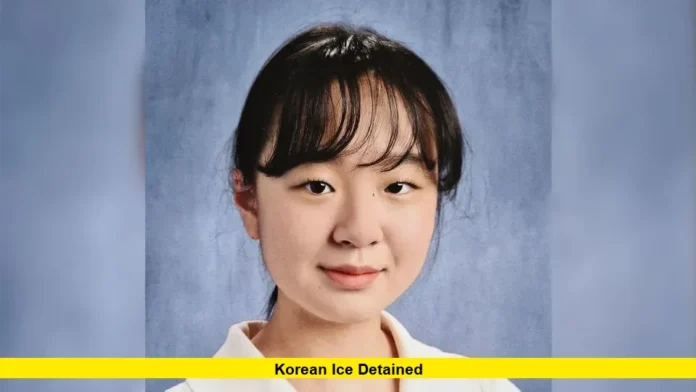A korean ice detained case has ignited widespread protests after 20-year-old Yeonsoo Go, daughter of beloved Episcopal priest Kyrie Kim and graduate of Scarsdale High School in Westchester County, was detained by Immigration and Customs Enforcement following what was supposed to be a routine visa hearing on July 31, 2025.
The detention has sparked fierce criticism from religious leaders, community members, and advocacy groups who argue that Go was unfairly targeted despite maintaining legal immigration status. Friends and supporters gathered at Federal Plaza on Saturday August 2, 2025 to protest the unlawful detention of Yeonsoo Go, demonstrating the growing community support for her release.
The Detention Details
Yeonsoo Go, a South Korean native, immigrated from Seoul with her mother on a religious visa roughly four years ago and was switching to a student visa. The 2024 Scarsdale High School graduate currently attends Purdue University and was in the process of transitioning her immigration status when the unexpected detention occurred.
On July 31, Go appeared before the New York Immigration Court for what family members described as a standard visa hearing. However, instead of receiving approval for her status change, she was taken into custody by ICE agents, shocking her family and legal representatives.
Current Location and Conditions
The situation has become more complex as Go is currently in detention at the Richwood Correctional Center in Monroe, Louisiana, according to ICE records. This transfer from New York to Louisiana has added to her family’s distress and raised questions about detention protocols.
According to Rev. Matthew Heyd of the Episcopal Diocese of New York, “Her mother gets regular calls from Yeonsoo and she’s staying at 26 Federal Plaza, which, as we know, is not actually a facility that has showers or beds or hot food”, highlighting concerns about detention conditions.
Legal Status Dispute
The case centers on conflicting interpretations of Go’s immigration status. The family said her stay was legally extended in 2023 and that her status remains valid through the end of 2025. However, immigration authorities reportedly interpreted her status differently and deemed her stay unlawful.
This discrepancy has become a focal point for advocates who argue that proper legal procedures were not followed during her detention.
Community Response and Advocacy
The Episcopal Diocese of New York and immigrant advocacy groups are calling for the immediate release of Go Yeon-soo, saying she was unfairly detained despite having legal status, and that immigration authorities bypassed proper legal procedures.
The korean ice detained case has mobilized various community groups:
- Religious organizations across denominations
- Immigration advocacy groups
- Local politicians and lawmakers
- Fellow students and alumni from Scarsdale High School
- Members of the Korean-American community
Family’s Emotional Response
“When I first heard the news about Yeonsoo, my mind went completely blank,” Go’s father, Sorg-young, told CNN. The family has expressed deep concern not only about the detention itself but also about the conditions and the distance from their support network.
The emotional toll on the family has been compounded by the uncertainty surrounding the case and the lack of clear communication from immigration authorities about the timeline for resolution.
Broader Immigration Implications
This korean ice detained incident reflects larger concerns about immigration enforcement policies and procedures. Legal experts point to several troubling aspects of the case:
The apparent contradiction between family documentation and ICE’s interpretation of Go’s status raises questions about consistency in immigration law application. The detention of a student with community ties and no criminal background has prompted discussions about enforcement priorities.
Political and Legislative Response
Westchester lawmakers have called for the release of the young woman detained by ICE, adding political pressure to the growing chorus of voices demanding action. Local representatives have criticized the handling of the case and called for immediate intervention.
The case has attracted attention from immigration reform advocates who view it as emblematic of broader systemic issues within the current immigration enforcement framework.
This developing story continues to unfold as supporters maintain pressure for Go’s release while her family navigates the complex legal processes ahead. What are your thoughts on this case and its implications for immigration enforcement policies?
